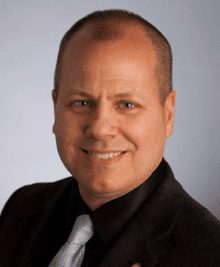
Eric Patterson serves as executive director of sensors and systems for Riverside Research and is a Pinnacle Awards finalist in the Intelligence Industry Executive of the Year category. Here, he shares key achievements and proud career moments, a turning point in his career, advice for aspiring leaders who want to follow in his footsteps and more.
What key achievements did you have over the past year?
This year, my team won a contract to begin developing a satellite constellation orchestration tool that seamlessly integrates commercial satellite imagery, enables anticipatory analytics, and calculates the optimal mix of commercial and non-commercial data sources. These capabilities blend together to inform better decisions in fast, operational timelines.
This tool allows the U.S. intelligence community to leverage a rapidly growing commercial imagery market for national security missions, which helps to improve persistence, resilience, spectral diversity, and radiometric, temporal and spatial resolutions.
We also migrated a similar constellation planning application into the cloud. Doing so allowed us to capitalize on the cloud environment’s scalable and elastic features to improve system performance. We achieved the first-ever security accreditation for this type of application in the cloud, giving the government the ability to orchestrate larger constellations across security levels in a single instantiation.
Both of these efforts help provide decision makers the data they need to make well-informed decisions and I’m really proud of my team for these achievements.
What are you most proud of having been a part of in your current organization?
Riverside Research is a not-for-profit organization, which means that we don’t have owners or shareholders who direct the use of our funds. As a group of technologists and scientists, we choose to reinvest our funds into research and development, solving our customers’ hard problems.
It is very gratifying to ask my customers “what do you need solved?” and then see their response when we offer candidate solutions. There’s a lot of intellectual and personal satisfaction and pride in that.
What has made you successful in your current role?
My current role is dynamic and collaborative. I have the opportunity to work with our internal business units and with our partner companies to develop multifaceted solutions that are the product of many great minds. I love that I get to facilitate teams that combine internal and external ideas to accelerate what we can do for our nation, and bring new methods and techniques to the fight.
One thing that really makes this possible is a scientific or academic mindset – of “open innovation.” I encourage my teams to look into and partner with academia, government and industry to find novel ideas, because collaborating with these folks often leads to true value for our customers.
This commitment to open innovation – both from myself and my team members – makes us successful.
What’s your best advice for aspiring leaders who want to follow in your footsteps?
I see it happen all the time… people get obsessed with success. I think the best advice I have for aspiring leaders is this: do not be afraid of failure. Every failure is an opportunity to learn about yourself, your leadership strengths and weaknesses, and pitfalls in your processes. Own this and use it to your advantage.
If you’re obsessed with success, you’ll start avoiding risks, but if you’re not making mistakes, you’re not working closely enough to the edge of your potential. I often remind myself that those moments when I’m out of my comfort zone, I’m growing the most.
What was a turning point or inflection point in your career?
I spent more than 20 years in the U.S. Air Force, and I’ve now been with Riverside Research for more than 15 years. Moving from military to industry was a major turning point in my career, but my mission stayed the same: improving the use of new and diverse intelligence sources that empower decision makers with better information.
Having a purpose like that is powerful — it has continued to drive me every day. Focusing on the mission rather than the surrounding circumstances is how I navigate through inevitable transitions in life and in work.
If I lose focus, I remind myself why I do what I do. The work we do in our community protects our warfighters and makes our nation stronger, and that’s really powerful motivation that helps me focus through noise.
Change is constant, both in our work and personal lives. Our company has experienced significant growth over the past few years. My background prepared me to adapt, adopt and focus on the mission, leading to continuous improvement.

